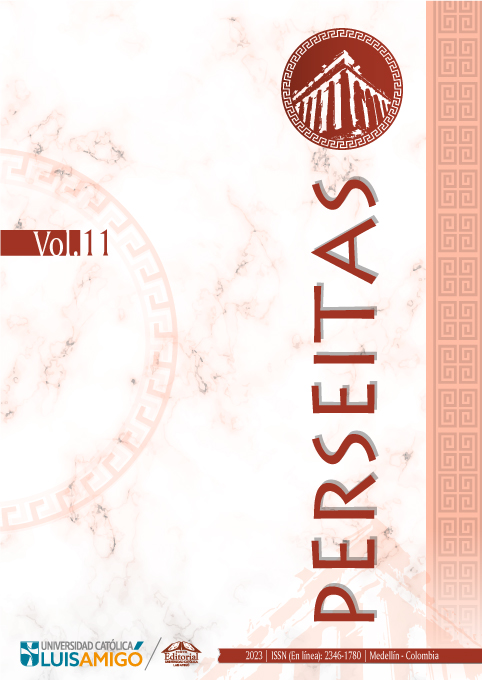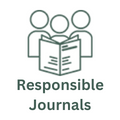Forgiveness and the human person: a reflection on the distinction between acceptance, liberation, forgiveness and reconciliation based on their interpersonal character
DOI:
https://doi.org/10.21501/23461780.4683Keywords:
Acceptance, Forgiveness, Interpersonally, Liberation, Person, ReconciliationAbstract
Contemporary culture and the conflict-laden context in which we currently reside demand forgiveness. This is particularly vital as it represents the path through which humans combat evil. However, the act of forgiveness has eroded due to the misconceptions associated with its application in psychology and public life. In this regard, this article seeks to provide a definition of forgiveness from his interpersonal character. In other words, this work affirms that it is in face-to-face encounters where persons confront evil, manifest their status as persons, and also the realm of gratuitousness to which their innermost reality responds. Thus, we will begin with the common definition of forgiveness and scrutinize each of its constituent elements to present as comprehensive a portrayal as possible of its reality. This portrayal will serve as an archetype for distinguishing forgiveness from self-acceptance, self liberation, and reconciliation. These distinctions propose the idea that forgiveness genuinely emerges from interpersonal relationships, where one person asks for the gift of freedom from the committed evil, and another freely grants it.
Downloads
References
Arendt, H. (2005). La condición humana (R. Gil Novales, Trad.). Paidós.
Austin, J. (1962). How to do things with words [Cómo hacer cosas con palabras]. Oxford University Press.
Begué, M.-F. (2011, 11-12 de agosto). Identidad y figuras del tiempo [Conferencia]. Simposio Paul Ricoeur, Buenos Aires, Argentina, Universidad Católica Argentina. https://repositorio.uca.edu.ar/bitstream/123456789/3975/1/identidad-figuras-tiempo-begue.pdf
Cázares-Blanco, R. (2020). Perdón y reciprocidad. Una alternativa al dilema gratuidad-condicionalidad del perdón. Anuario Filosófico, 53(1), 37–61. https://doi.org/10.15581/009.53.1.002
Crespo, M. (2016). El perdón. Una investigación filosófica. Encuentro.
Dans-Álvarez-de-Sotomayor, I., & Muñiz-Álvarez, E.-M. (2021). El perdón como forma de aprendizaje. Estudios sobre Educación, 40, 9–25. https://doi.org/10.15581/004.40.9-25
Derrida, J. (2015). To Forgive: The Unforgivable and the Imprescriptible [Perdonar. Lo Imperdonable y lo Imprescriptible]. En H de Vries & N. Schott (Eds.), Love and Forgiveness for a More Just World [Amor y perdón para un mundo más justo] (pp. 144–181). Columbia University Press. https://doi.org/10.7312/columbia/9780231170222.003.0011
Enright, R. D. (1996). Counseling within the forgiveness triad: On forgiving, receiving forgiveness, and self-forgiveness [Consejería en la tríada del perdón: perdonar, recibir perdón y auto-perdón]. Counseling and Values, 40(2), 107–126. https://doi.org/10.1002/j.2161007X.1996.tb00844.x
Escríbar Wicks, A. (2011). Liberados por el perdón, pero atados por la promesa. Cuadernos Judaicos, (28), 20–30. https://cuadernosjudaicos.uchile.cl/index.php/CJ/article/view/23089
Esparza, D., & Diez Bosch, M. (2021). Perdón y vida pública: Hannah Arendt y la sungnome griega. Daimon, (83), 57–69. http://dx.doi.org/10.6018/daimon.362991
Gibu Shimabukuro, R. (2016). Sobre el resentimiento y el perdón. Open Insight, 7(12), 9–29. http://openinsight.com.mx/index.php/open/article/view/174
Guardini, R. (1960). La aceptación de sí mismo. Las edades de la vida. Parroquial de clavería.
Ivic, S. (2021). Jacques Derrida’s philosophy of forgiveness [La filosofía del perdón de Jacques Derrida]. Filosofia Unisinos, 22(2), 1–9. https://doi.org/10.4013/fsu.2021.222.01
Jankélévitch, V. (1987). Perdonare? [¿Perdonar?]. La Giuntina.
Kim, J. J., & Enright, R. D. (2014). A theological and psychological defense of self-forgiveness: Implications for counseling [Una defensa teológica y psicológica del auto-perdón: implicaciones para la Consejería]. Journal of Psychology and Theology, 42(3), 260–268. https://doi.org/10.1177/009164711404200303
Lopes, E. (2021). El Perdón en el pensamiento de Dietrich von Hildebrand. Cauriensia. Revista Anual De Ciencias Eclesiásticas, 16, 455 -473. https://doi.org/10.17398/2340-4256.16.455
López Pell, A. F., Kasanzew, A., & Fernández, M. S. (2008). Los efectos psicoterapéuticos de estimular la connotación positiva en el incremento del perdón. Avances en Psicología Latinoamericana, 26(2), 211–226. https://revistas.urosario.edu.co/index.php/apl/article/view/63
Lythgoe, E. (2008). El desarrollo del concepto de testimonio en Paul Ricoeur. Eidos, 9, 32–56.
Martín González, M del R., & Fuentes, J. L. (2012). Los límites de las modas educativas y la condición humana. Un hueco para la educación de las grandes experiencias: el perdón. Revista Española de pedagogía, LXX(253), 479–494. https://revistadepedagogia.org/wp-content/uploads/2012/09/253-05.pdf
Millán-Ghisleri, E., & Ahedo-Ruiz, J. (2023). Perspectiva antropológica del perdón desde Hannah Arendt y Leonardo Polo. Sophia. Colección de Filosofía de la Educación, (34), 65–86. https://doi.org/10.17163/soph.n34.2023.02
Muñoz, S. (2012). La dimensión ético-existencial del perdón como correctivo de las políticas del perdón. Astrolabio. Revista internacional de filosofía, (13), 316–324. https://www.raco.cat/index.php/Astrolabio/article/view/257066
Peterson, S. J., Van Tongeren, D. R., Womack, S. D., Hook, J. N., Davis, D. E., & Griffin, B. J. (2017). The benefits of self-forgiveness on mental health: Evidence from correlational and experimental research [Los beneficios del auto-perdón en la salud mental: datos procedentes de investigaciones correlacionales y experimentales]. Journal of Positive Psychology, 12(2), 159–168. https://doi.org/10.1080/17439760.2016.1163407
Prada, M. A., & Ruiz, A. (2021). El esquivo perdón. Praxis & Saber, 12(30), e12682. https://doi.org/10.19053/22160159.v12.n30.2021.12682
Prieto-Ursúa, M., & Echegoyen, I. (2015). ¿Perdón a uno mismo, autoaceptación o restauración intrapersonal? Cuestiones abiertas en psicología del perdón. Papeles del Psicólogo, 36(3), 230–237. https://www.papelesdelpsicologo.es/pdf/2617.pdf
Ricciardi, E., Rota, G., Sani, L., Gentili, C., Gaglianese, A., Guazzelli, M., & Pietrini, P. (2013). How the brain heals emotional wounds: The functional neuroanatomy of forgiveness [Cómo el cerebro cura las heridas emocionales: la neuroanatomía funcional del perdón]. Frontiers in Human Neuroscience, 7, 1–9. https://doi.org/10.3389/fnhum.2013.00839
Ricoeur, P. (2000). La memoria, la historia, el olvido (A. Neira, Trad.). Fondo de Cultura Económica.
Ricoeur, P. (2013). Tiempo y Narración I: Configuración del tiempo en el relato histórico (A. Neira, Trad.). Siglo XXI.
Roldán, J. P. (2004). Algunas consideraciones sobre J. Pieper y el tema del mal en la problemática filosófica contemporánea. Sapientia, 59(216), 507–514. https://repositorio.uca.edu.ar/bitstream/123456789/12293/1/algunasconsideracinoes-pieper-mal.pdf
Sandrin, L. (2014). Perdón y reconciliación. La mirada de la psicología. PPC.
Searle, J. R. (1969). Speech Acts: An Essay in the Philosophy of Language [Actos del discurso. Ensayo de filosofía del lenguaje]. Cambridge University Press.
Serretti, M. (2008). L’uomo è persona [El hombre es persona]. Lateran University Press.
Serretti, M. (2011). Naturaleza de la comunión. Ensayo sobre la relación (R. Gibu Shimabukuru, Trad.). Universidad Católica San Pablo.
Wojtyla, K. (2011). Persona y acción (R. Mora, Trad.). Palabra.
Published
How to Cite
Issue
Section
License

This work is licensed under a Creative Commons Attribution-NonCommercial-NoDerivatives 4.0 International License.
La revista y los textos individuales que en esta se divulgan están protegidos por las leyes de copyright y por los términos y condiciones de la Licencia Creative Commons Atribución-No Comercial-Sin Derivar 4.0 Internacional.
















